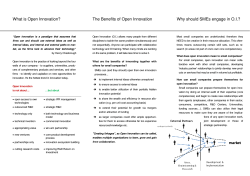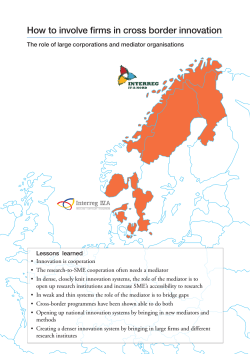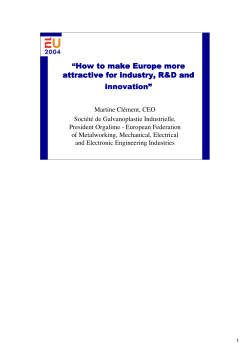
UEAPME Newsflash Tripartite Social Summit: competitiveness must be put first
UEAPME NEWSFLASH ISSUE NO. 276 24 OCTOBER 2014 UEAPME Newsflash Tripartite Social Summit: competitiveness must be put first At the Tripartite Social Summit, President Gunilla Almgren insisted on the need to make the best use of the growth momentum by putting SMEs’ competitiveness at the forefront. Fostering private investments and implementing structural reforms, including labour markets, are the key conditions for growth and jobs. Referring to the EU SME Barometer results, Ms Almgren confirmed a new SME optimism for the next months. However, this growth in the SME sector is only due to existing capacities and workforce hence does not yet result in further investment or additional jobs. She also highlighted potential risks such as the lack of SMEs’ access to finance that may hamper investments and new political crises that may affect the economy. If the EU Council is not able to find a solution on the Climate and Energy 2030 framework and if 2015 commitments of other major economies are not at the same level, new possible burdens for SMEs could occur, warned Ms Almgren. Contact: Liliane Volozinskis Red tape discussed in OECD workshop President Gunilla Almgren spoke at an OECD workshop in Paris on “Overcoming administrative hurdles for SMEs: new strategies and instruments”. She stressed that, first off, we need a new legislative culture. Indeed, legislation should be made with small enterprises in mind. It is our role, she stated, to convince public authorities and all other stakeholders (trade unions, NGOs) that it is in everyone’s interest to have smart regulation, not only for enterprises but for all citizens as well as the public authorities and administrations. On exemptions, Ms Almgren again warned that they can be counterproductive since they can hamper trust in SMEs and their products if they are not subject to the same rules. As such, exemptions are pushing SMEs out of the market .Contact: Luc Hendrickx EU 2020: Priority for competitiveness and implementation UEAPME replied to the consultation on the review of the EU 2020 Strategy by saying that – from the first five years – the following lessons were learnt: i) growth and jobs have to come from the private sector; ii) there is a need for stronger economic governance to avoid negative spill-over effects between Member States and iii) more efforts have to be put towards an effective implementation of jointly agreed reforms and policies. Therefore, UEAPME asks for priority to be given to competitiveness in order to make private investments in Europe more attractive; to better integrate the EU 2020 Strategy with the economic governance structures (such as the European Semester) and to involve national and European stakeholders (such as social partners) in the development of policies to create ownership on reform processes and enhance their implementation. Contact: Gerhard Huemer ECOFIS: economic situation, SME finance and EU2020 The UEAPME ECOFIS Committee chaired by Vice President Kentzler analysed the current economic situation of SMEs in Europe as well as their perspectives. The discussion emerged from the quite promising results of the new EU SME Barometer, but resulted in a more pessimistic outlook caused by the recent decline of the overall economic climate. Furthermore, the Committee adopted the UEAPME reply to the consultation on the Europe 2020 Strategy (see article above). Finally, the participants exchanged views on the new SME finance instruments with the Secretary General of AECM (Credit Guarantee Organisations) and discussed possibilities to improve the regulatory environment for small local banks in order to make them better able to finance SMEs and render the foundation of new small banks more attractive. After the Committee meeting, the UEAPME Study Group gathered to discuss future projects for the Study Unit. Contact: Gerhard Huemer Multilevel Governance & Partnership require much more Last week, Social Affairs Director Liliane Volozinskis chaired the employer’s group of the EU Social Fund Committee in Rome. Negotiations, with the EC, of Partnership Agreements (PAs) and Operational Programmes (OPs) were the key topic. With the new regulation, national and regional authorities have to involve economic and social partners in PAs and OPs, as foreseen in the EU Code of Conduct on Partnership within the EU Structural and Investments Funds (ESIF). According to UEAPME, the multi-level governance principle is far from being implemented as confirmed by the Van den Brande Report. National social partners explained in detail how and why more efforts are needed on both sides, so as to change the mind-set of public authorities but also for pro-activeness and more resources on the social partners’ side. Again, UEAPME has called on the EC for more technical assistance and training for SME organisations to make ESIF more accessible. Contact: Liliane Volozinskis Horizon 2020 SME Instrument now be tested in praxis Economic Policy Director Gerhard Huemer took part in the H2020 Advisory Group on SME participation. The group discussed first encounters with the new SME Instrument in the Horizon 2020 Programme as well as the strategic programme for 2016/17. Mr Huemer argued that after the first two cut-off dates the presented projects have demonstrated that more information and support at national level are necessary to attract the right innovation projects from SMEs. These have to come from the Enterprise Europe Network and the national contact points for H2020 – in cooperation of course with national and regional SME organisations. Furthermore, UEAPME demanded new financial instruments (mezzanine loans) for the commercialisation phase, considering that classical loans are not able to carry the risk of innovation and venture capital or business angels finance too often lead to a situation where the SME owner is losing the control over the company. Contact: Gerhard Huemer UEAPME NEWSFLASH ISSUE NO. 276 24 OCTOBER 2014 Sorbonne students visit UEAPME and CGPME Students of the “Centre d’Economie de la Sorbonne, Université Paris 1” taking a Master degree on Creation and Development of Enterprises visited UEAPME following the invitation from our French member CGPME. The mission and working of the CGPME office in Brussels and the different European institutions it deals with were presented. Enterprise Policy Luc Hendrickx gave the students an overview of SMEs in the EU and informed them about the manner in which UEAPME defends SME interests towards the European Institutions. Contact: Luc Hendrickx ------------------------------------- News from UEAPME Projects --------------------------------- Committee on Standards vote draft mandates SBS Project Manager Sandrine Laurent took part in the 6th meeting of the Committee on Standards where Member States voted draft mandates on space heaters, water heaters and material efficiency aspects. Participants also received updated information on the status of the EC’s Vademecum (a document aiming to serve as a legally non-binding guide on European standardisation), on the ICT platform as well as on the state of play of the independent review study – SBS is actively involved in all three. Finally, the European commission also provided input on standardisation in the field of services, another important topic for SBS. Contact: Sandrine Laurent EVENTS AHEAD: • • • TURKONFED EU Representation Office: Inauguration reception (17.11, contact Luc Hendrickx) Competitive enterprises, successful regions (18.11, contact Birte Day) Late payment information campaign (18.11, contact Luc Hendrickx) 6th European Forum Co-operative Banks and SMEs (01.12, contact Gerhard Huemer) • Registration now open Visit CloudingSMEs project website. Please fill in feedback questionnaire for end users. SUBSCRIBE / UNSUBSCRIBE / PAST ISSUES To subscribe to, unsubscribe from or read and download all the issues of the UEAPME Newsflash, please visit the following link: http://www.ueapme.com/spip.php?rubrique14 UEAPME Newsflash Compiled by: Jenny Manin Press and communications officer Phone: +32 2 230 7599 Mobile: +32 496 520 329
© Copyright 2025










